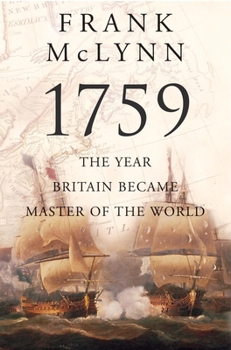1759: The Year Britain Became Master of the World
Select Format
Select Condition 
Book Overview
If not for the events of 1759, the entire history of the world would have been different. Called the "Year of Victories," 1759 was the fourth year of the Seven Years, or the French-and-Indian War and defeat of the French not only paved the way for the global hegemony of the English language but also made the emergence of the United States possible. Guiding us through England's conquests (and often extremely narrow victories) in India, North America, and the Caribbean, Frank McLynn (Wagons West) controversially suggests that the birth of the great British Empire was more a result of luck than of rigorous planning. Along with stirring depictions of the two greatest battles of 1759, Quebec and Quiberon, McLynn includes anecdotes of the intellectual and cultural leaders of the day--Swedenborg, Hume, Voltaire--and interweaves primary sources, ranging from material in the Vatican archives to oral histories of Native Americans, in a brilliant chronicle of a pivotal year in world history.
Format:Hardcover
Language:English
ISBN:0871138816
ISBN13:9780871138811
Release Date:January 2005
Publisher:Atlantic Monthly Press
Length:432 Pages
Weight:1.71 lbs.
Dimensions:9.3" x 1.5" x 6.5"
Customer Reviews
3 ratings
History, not literature
Published by Thriftbooks.com User , 15 years ago
The book provides an overview of what is considered the most significant year in the Seven Years War (what some people in the US call the French and Indian War). I grew up with US history that concentrated on events in North America. This provides a wider range, giving an overview of events in North America, the West Indies, Europe, and India. It is somewhat dry reading, and is more a reference for information on various events (it is possible to selectively read about particular events of interest). It is always an effort to try to reduce events down to a single book. It does cover some of the politics of the era, along with the military action. Weather conditions often decided the outcome. I would note that the book includes information on the debt encurred by the British government as a result of the war. Wars always seem to be fought using credit. In this case it led to taxation to pay off the debt which caused the initial problems with the American colonies. The colonies of course fought the Revolutionary War, borrowing money to do that, and ended up with the same problem of imposing taxes to pay off the debt, but that is another story.
Brilliant history
Published by Thriftbooks.com User , 18 years ago
A prior reviewer says that he is "disappointed" with this book and that the author "can't even write a simple declarative sentence." What I wonder is, from what correspondence course did the reviewer get his degree? More disturbing is how he found 24 people to agree with him. Those ratings must have come from a reluctant class assigned to read this book by some misguided middle school teacher. The book is erudite, exhaustively researched, and enlightening in its conclusions about how Britain became the greatest power in the world. It is a wonderfully well-written book that I would highly recommend to any literate person.
The Story Of The Annus Mirabilis
Published by Thriftbooks.com User , 20 years ago
Some years are immediately recognized by the people who lived through them as being major turning points in history. 1776 is an obvious example, and so is 1759. However, many people today would be hardpressed to remember any earthshaking events that took place in 1759. Frank McLynn has taken the annus mirabilis (as it was known in Britain at the time) and given it new life. 1759 was the center point of the Seven Years War, a titanic struggle which has often been called the first true world war. Many nations and areas were involved in the conflict, but the primary combatants were Britain and France. The two European superpowers had been locked in battle for most of the last eighty years over who was going to be supreme in Europe and in the colonial areas. McLynn divides his book into chapters dealing with different areas which were at the center of the struggle in 1759: Europe, India, the Caribbean, and North America. He describes such climatic battles as The Plains of Abraham and Quiberon Bay so clearly that even readers without military backgrounds can fully comprehend the strategies of the commanders. He provides short but clear biographies of the leading actors in the drama of 1759 like George II, William Pitt, Louis Montcalm, Madame de Pompadour, and Louis XV. Most impressively, he provides detailed but understandable analyses of the military and financial strengths and weaknesses of Britain and France. I also appreciated the amount of material McLynn provides on the North American Indians and their societies, and how they played off the Europeans against each other in order to maintain their own existence. McLynn is fair minded, giving horrific details of Indian atrocities against Europeans, but then describing similar atrocities performed by Europeans against the Indians and putting both in the context of what was a violent and bloodthirsty century (No "civilization against the savages" theme for McLynn, in other words). I especially enjoyed the short prologues at the beginning of most of the chapters giving some cultural perspectives on what was happening during 1759, so that the reader doesn't come away with the impression that it was all battle and no art or literature. I tend to be a little doubtful that the Jacobites played quite as large a role in many of 1759's events as McLynn makes out, but that is understandable in that the declining fortunes of the Stuarts and their followers has been a central focus of his studies over many years. All in all, 1759 is a masterful study of a year we ought to remember better.






